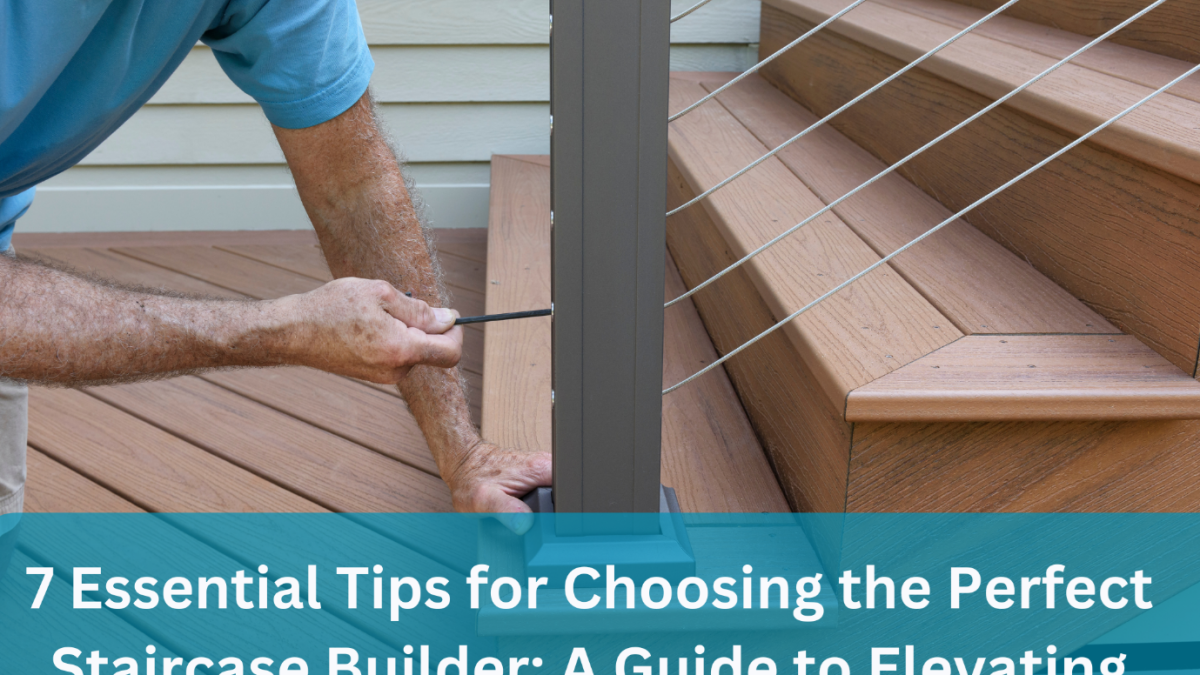
Innovative Home Renovations That Boost Property Value
July 12, 2024
A Comprehensive Guide to Split System
October 11, 2024Have you ever walked into a home and been immediately captivated by a stunning staircase that seems to effortlessly blend form and function? Or perhaps you’ve experienced the opposite – a poorly designed staircase that feels like an afterthought, detracting from the overall aesthetic of the space. When it comes to home design, staircases often play a pivotal role in setting the tone for the entire property. But have you considered the impact a well-crafted staircase can have on your home’s value and appeal?
The importance of a quality staircase extends far beyond mere aesthetics. It’s a functional element that connects different levels of your home, a safety feature that needs to withstand daily use, and often, a significant investment in your property. But how do you ensure that your vision for the perfect staircase becomes a reality? The answer lies in choosing the right staircase builder – a decision that can make or break your home improvement project.
In this comprehensive guide, we’ll explore seven essential tips for selecting the ideal staircase builder to bring your design dreams to life. From researching and gathering inspiration to evaluating craftsmanship and considering safety regulations, we’ll cover all the crucial aspects you need to consider. Whether you’re renovating an existing staircase or installing a brand new one, this article will equip you with the knowledge and confidence to make an informed decision. So, are you ready to take the first step towards elevating your home’s design with a stunning, well-crafted staircase?
Tip 1: Research and Gather Inspiration
Before you even begin the process of hiring a staircase builder, it’s crucial to have a clear vision of what you want. This first step is all about exploration and creativity. Start by immersing yourself in the world of staircase design. Browse through home improvement magazines, scroll through Pinterest boards, and explore architecture websites to discover the vast array of staircase styles and materials available.
As you conduct your research, pay attention to different elements such as the overall shape of the staircase (spiral, straight, L-shaped), the materials used (wood, metal, glass), and the various design details (balusters, handrails, treads). Create a mood board or a digital inspiration folder where you can collect images of staircases that resonate with your taste and style. This visual collection will not only help you refine your preferences but also serve as a valuable communication tool when you start discussing your project with potential builders.
While gathering inspiration, it’s essential to consider your home’s existing architectural style. A ultra-modern floating staircase might look out of place in a traditional Victorian home, while a classic wooden staircase could clash with a sleek, contemporary interior. Look for designs that complement your home’s overall aesthetic while still reflecting your personal style.
Tip 2: Check Credentials and Experience
When it comes to hiring a staircase builder, credentials and experience are non-negotiable factors. The first step in this process is to verify that the builder you’re considering is properly licensed and insured. A valid license indicates that the builder has met the necessary requirements set by local authorities to perform construction work. Insurance, on the other hand, protects you from liability in case of accidents or damage during the construction process.
Beyond these basic requirements, take the time to assess the builder’s portfolio and years of experience. A reputable staircase builder should be able to provide you with a comprehensive portfolio showcasing their previous projects. This will give you a clear idea of their style, craftsmanship, and the range of designs they’re capable of executing. Pay attention to the diversity of projects in their portfolio – a builder who has experience with various styles and materials is likely to be more versatile and able to adapt to your specific needs.
Another crucial aspect to consider is the builder’s specialization in staircase construction. While many general contractors can build staircases, there’s significant value in working with a specialist. Staircase construction requires specific skills and knowledge, from understanding complex building codes to mastering the art of seamless joinery. A builder who specializes in staircases is likely to have a deeper understanding of these nuances, potentially resulting in a higher quality end product. Don’t hesitate to ask potential builders about their specific experience with staircases similar to what you’re envisioning for your home.
Tip 3: Read Reviews and Seek Recommendations
In the digital age, we have unprecedented access to information about service providers, and staircase builders are no exception. Utilize online review platforms such as Houzz, Yelp, or Google Reviews to get a sense of past clients’ experiences with the builders you’re considering. These reviews can provide valuable insights into the builder’s reliability, communication style, quality of work, and ability to meet deadlines. However, remember to approach online reviews with a critical eye – look for patterns in feedback rather than focusing on isolated negative comments.
While online reviews are useful, there’s still immense value in personal recommendations. Reach out to friends, family members, or colleagues who have recently had staircase work done in their homes. Their firsthand experiences can offer a more nuanced perspective than what you might find online. Additionally, consider asking other tradespeople you trust, such as architects or interior designers, for their recommendations. These professionals often have extensive networks in the construction industry and can point you towards reputable staircase builders.
Word-of-mouth recommendations hold particular weight in the building industry. A builder who comes highly recommended by someone you trust is likely to prioritize customer satisfaction and maintain a good reputation in the community. When seeking recommendations, ask specific questions about the builder’s communication, problem-solving skills, and ability to stay within budget and timelines. Remember, a positive recommendation isn’t just about the end result – it’s about the entire experience of working with the builder throughout the project.
Tip 4: Request Detailed Quotes and Compare
Once you’ve narrowed down your list of potential staircase builders, it’s time to request detailed quotes. A comprehensive quote should include more than just a final price – it should provide an itemized breakdown of costs for materials, labor, and any additional services. This level of detail allows you to understand exactly what you’re paying for and makes it easier to compare quotes from different builders.
When reviewing quotes, pay attention to what’s included and what isn’t. Are design services part of the package, or will you need to hire a separate designer? Is the cost of permits included? What about clean-up and disposal of old materials if you’re renovating an existing staircase? Understanding these details can help prevent unexpected costs down the line.
As you compare quotes, be wary of any that seem significantly lower than the others. While it’s tempting to go for the cheapest option, an unusually low quote could be a red flag. It might indicate that the builder is cutting corners, using inferior materials, or hasn’t fully understood the scope of the project. On the other hand, the most expensive quote doesn’t necessarily guarantee the best quality. The key is to balance cost with the builder’s experience, reputation, and your confidence in their ability to deliver the staircase you want.
Tip 5: Communication and Design Process
Clear communication is the cornerstone of any successful construction project, and staircase building is no exception. From the initial consultation to the final installation, you should feel comfortable discussing your ideas, concerns, and questions with your chosen builder. Pay attention to how responsive and attentive potential builders are during the quoting process – this can be a good indicator of their communication style throughout the project.
Understanding the design process and timeline is crucial for setting realistic expectations. A reputable staircase builder should be able to walk you through each stage of the project, from initial design concepts to final installation. They should provide a clear timeline, including key milestones and potential factors that could affect the schedule. Don’t hesitate to ask about their process for handling changes or unexpected issues that might arise during construction.
For custom designs, the ability to collaborate effectively with your builder is paramount. Look for a builder who is open to your ideas and can offer constructive suggestions based on their expertise. Some builders may offer 3D rendering or visualization services, which can be incredibly helpful in bringing your vision to life before construction begins. This tool allows you to see how different design choices will look in your space and make informed decisions about materials, colors, and overall style.
Tip 6: Consider Safety and Compliance
When it comes to staircases, safety is not just a consideration – it’s a necessity. A reputable staircase builder should have an in-depth understanding of building codes and regulations specific to staircase construction. These regulations cover various aspects such as the height and depth of steps, the spacing between balusters, and the required width of the staircase. During your discussions with potential builders, ask about their familiarity with local building codes and how they ensure compliance in their projects.
Handrails and balustrading play a crucial role in staircase safety. They provide support for users and prevent falls, especially on open-sided staircases. Your chosen builder should be able to advise on the most suitable options for your staircase design while ensuring they meet safety standards. This might include recommendations on the height and strength of handrails, the spacing of balusters, and the most appropriate materials for your specific design.
If you have young children in your home, or are planning for a family in the future, child safety should be a key consideration in your staircase design. Discuss options such as gates at the top and bottom of the stairs, or consider designs that minimize potential hazards for curious little ones. Similarly, if you’re planning to age in place, or if accessibility is a concern, talk to your builder about incorporating features like wider treads, gentler slopes, or the possibility of future stairlift installation.
Tip 7: Evaluate Material Quality and Craftsmanship
The quality of materials used in your staircase construction can significantly impact both its appearance and longevity. Different materials – such as timber, steel, or glass – each have their own advantages and considerations. A knowledgeable staircase builder should be able to guide you through these options, explaining the pros and cons of each in terms of durability, maintenance requirements, and aesthetic appeal.
Don’t overlook the importance of quality hardware and fixings. While these elements might not be as visible as the main components of the staircase, they play a crucial role in its structural integrity and longevity. Ask potential builders about the type and quality of fixings they use, and why they prefer certain brands or materials over others.
The finishing process can make a significant difference in the final look and feel of your staircase. Whether it’s the staining of wooden treads, the powder coating of metal components, or the polishing of glass balustrades, the quality of the finishing work can elevate a good staircase to a great one. Discuss the finishing options available and ask to see examples of the builder’s previous work to gauge their attention to detail.
When evaluating a builder’s craftsmanship, look beyond just the overall appearance. Pay attention to the precision of joints, the consistency of finishes, and the smoothness of transitions between different materials. A builder who takes pride in their work will be able to point out these details and explain the techniques they use to achieve a high-quality finish.
Conclusion
Choosing the right staircase builder is a critical decision that can significantly impact the success of your home improvement project. By following these seven essential tips – from thorough research and inspiration gathering to evaluating credentials, communication, safety considerations, and craftsmanship – you’ll be well-equipped to make an informed choice.
Remember that a well-designed and expertly crafted staircase is more than just a functional element in your home. It’s a statement piece that can enhance your property’s value, improve its aesthetic appeal, and contribute to the overall flow and functionality of your living space. The right builder will not only bring your vision to life but also provide valuable insights and expertise throughout the process.
As you embark on your staircase project, trust your instincts and don’t rush the decision-making process. Take the time to thoroughly vet potential builders, ask plenty of questions, and ensure that you feel confident in their ability to deliver the staircase of your dreams. With careful consideration and the guidance provided in this article, you’re well on your way to elevating your home’s design with a stunning, safe, and expertly crafted staircase.







